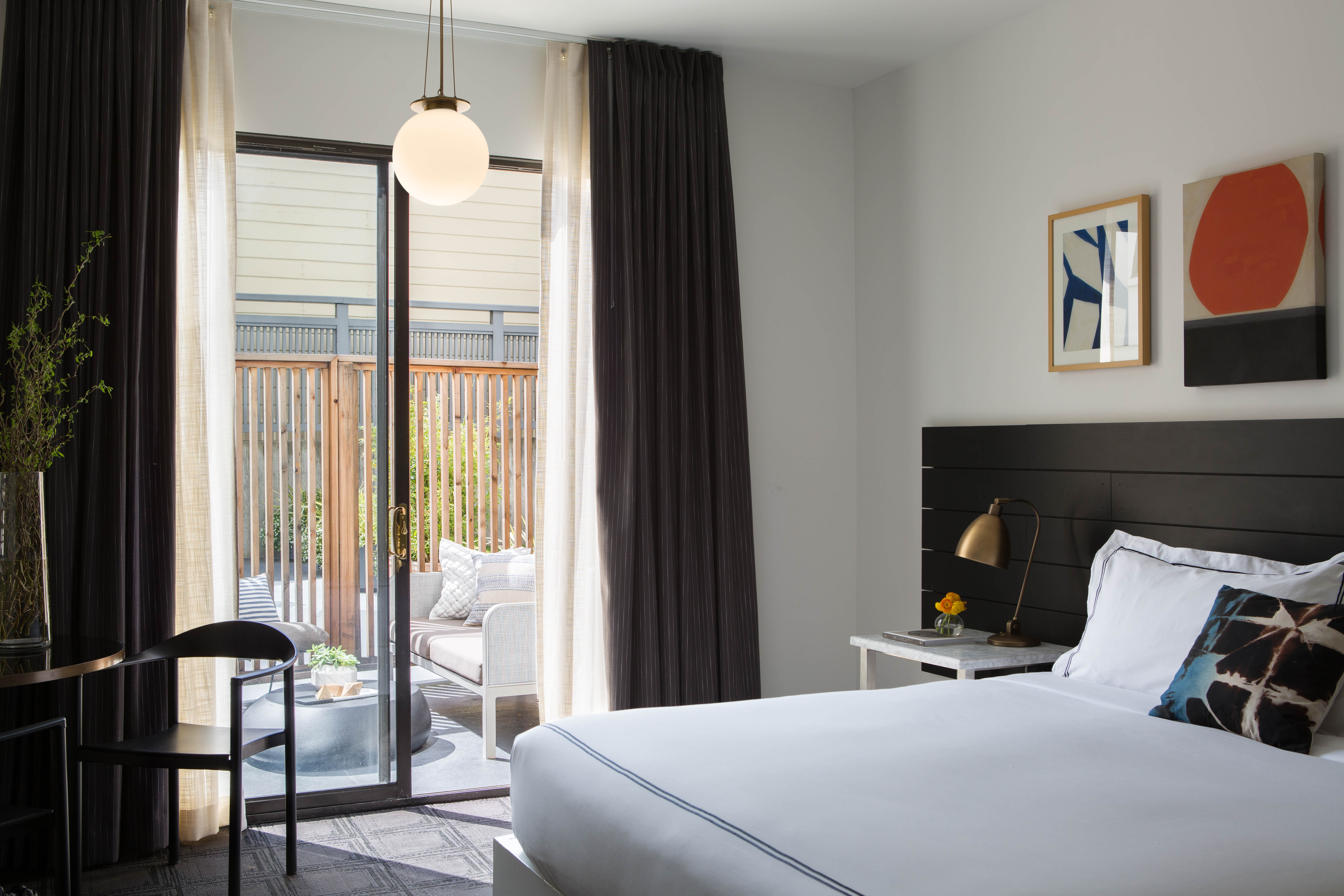Choosing, then following, a career path is a daunting task. It helps when you have astute people by your side. For Mike Depatie, that person was Jack DeBoer, a giant in the hotel industry, often credited with inventing the extended-stay segment through his founding of Residence Inn, Summerfield Suites and Candlewood Suites. DeBoer as a mentor, teaching the ins and outs of hospitality, is like having Dr. J instruct on the art of the dunk, Vladimir Horowitz illustrate finger placement on a piano, Henry Clay explain the finer points of compromise: It doesn’t get much better.
It’s where Depatie’s story began and ultimately where it led to: Depatie is the current managing partner of KHP Capital Partners, a San Francisco-based real estate private equity firm, focused on investments in boutique and independent hotels. In the preceding years, Depatie was CEO of Kimpton Hotels, a position he held for nine years.
And, like many stories, Depatie’s association with DeBoer was one of serendipity: Both are from Kalamazoo, Mich. It pays to be a Midwest boy.
After graduating Harvard Business School in 1983, Depatie got a job with Dallas-based real estate development, investment and operations company Trammell Crow Company. He’d be there a year.
“I got a call from Jack saying, ‘We need a CFO to help us arrange financing; would you come to Wichita?’” Depatie said. The need was for Residence Inn, which DeBoer founded in 1975. How can anyone turn down Jack DeBoer? Depatie took the job, and moved to Wichita to help the fledgling company with seven hotels. Three years later it would have some 100 hotels and be sold to Marriott International. “It’s how I got into the business,” Depatie said.

A Meteoric Rise
From there, Depatie would help with other DeBoer ventures, co-founding Summerfield Suites, which was eventually sold to Hyatt Hotels Corp. He later became CFO of La Quinta Inns & Suites, and held other CFO positions with varying companies. That’s until 2003, when Depatie joined the pioneering boutique brand, Kimpton Hotels & Restaurants, founded by another hospitality icon, Bill Kimpton, in 1981.
There, he ascended to CEO, and was at the helm when, in December 2014, InterContinental Hotels Group acquired Kimpton for $430 million. The sale was driven by Depatie and received considerable bids from both U.S. and international suitors. Ultimately, IHG won out, and while Depatie is adamant that Kimpton was to be sold to the highest bidder, he is happy IHG prevailed in the end. “We thought, in time, it would be helpful for Kimpton to be affiliated with a larger brand,” Depatie said. IHG’s ownership of Kimpton would also help Depatie with his next act.
Subsequent to the Kimpton sale, Depatie stepped down as CEO to lead KHP Capital Partners, with roots that stretch back to 2004 when it was the real estate arm of Kimpton. Post Kimpton sale, it was spun off as a separate company and is owned by Depatie and former Kimpton executives, including Joe Long and Ben Rowe.
Leaving Kimpton as CEO was bittersweet for Depatie. “In a lot of ways, it’s better, because it’s simpler and when you are the owner, and not the brand, there are less conflicts of interest,” Depatie said of his current station. He does, however, miss the scale of Kimpton, as he put it. “I like to grow and hire people and watch them grow.”
It’s no surprise, then, that his proudest accomplishment at Kimpton had nothing to do with RevPAR or revenues. No, it was the fact that Kimpton was seven times named by Fortune as one of the “100 Best Places to Work,” and that Kimpton, in 2013 and 2014, was ranked No. 1 by J.D. Power in guest satisfaction in the upper-upscale segment. “As a hotel brand CEO, it doesn’t get much better than that,” Depatie proudly said.

Owning, Not Operating
Today, instead of running a 62-hotel company with 9,000 employees, it is 19 hotels owned or under development—the bulk of which are Kimpton hotels—and 18 employees. To date, KHP has raised four institutional funds totaling $772 million in committed equity capital. Its latest fund has $210 million of pledged capital.
KHP’s structure is not heavily equity driven, which is to say it puts the sweat in off the back of others’ money. KHP’s business, according to Depatie, works with institutional investors, who put up roughly 98 percent of the capital. KHP then pays its investors a preferred return on their investment and then splits the profits 80/20. It is also paid a fund-management fee for finding and/or developing the hotels, administering the funds and asset-managing the hotels. It also gets paid fees for any hotels it develops or redevelop.
KHP is the largest owner of Kimpton properties. Twelve of its hotels that are currently open and operating are Kimptons, with five more on the way. Two others, the Hilton Key Largo (Fla.) and DoubleTree in Washington, D.C., are currently being recapitalized and will re-emerge under Hilton Worldwide’s Curio Collection.
That’s where a hotel company like IHG pays dividends. Its size and breadth opens up Kimpton hotels to new travelers, particularly international travelers, who may not have known the Kimpton brand before. More guests, more revenue. “As the largest owner of Kimpton properties, we wanted to land someplace where someone could expand it internationally, and bring brand strength,” Depatie said.

If It’s Broke—Fix It
Though KHP’s structure is sturdy, its strategy can be characterized as one based on breakage. KHP’s expertise lies in finding underperforming assets, then recapitalizing and repositioning them. “We buy stuff that’s broken typically, fix it up, stabilize it, realize the value, then sell,” Depatie said. To that end, adaptive-use projects—acquiring an office building or other asset class and converting it into a hotel—have become more and more part of KHP’s game plan.
Consider a yet-to-be-named hotel project in Pasadena, Calif. KHP is currently working through the city entitlement process to redevelop the Julia Morgan-designed YWCA building, adjacent to Pasadena City Hall (which you may be familiar with: It regularly doubled as Pawnee City Hall on the popular NBC series “Parks and Recreation”), into a 176-room hotel. As Depatie told it, part of the project will be the adaptive reuse of the YWCA and part will be the addition of a new-build rooms tower.
There, too, is The Kimpton Gray, a 293-key adaptive reuse of Chicago’s New York Life Insurance Building, which dates back to 1894. The hotel is expected to open in the fall.
“We are value-add guys,” Depatie said. “We buy good assets, in good markets, below replacement cost and at low leverage. We are not interested in putting projects in place at replacement cost. That strategy works.” (He added that KHP can do new-builds with up to 25 percent of its latest fund.)
It’s also the reason why KHP hasn’t had to contend much with the likes of foreign capital, which has been ravenous of late for hospitality-related U.S. assets. “They are buying things that are stabilized, and skew more luxury,” Depatie said. Still, he believes that foreign appetite for U.S. assets should only increase, due, in part, to recent changes to the Foreign Investment in Real Property Tax Act. Among other changes, it exempts foreign pension funds from FIRPTA tax and withholding. This exemption further applies in the case where a foreign pension fund indirectly holds a U.S. real property interest. Removing this tax barrier gives impetus for foreign pension funds to invest in U.S. real estate.
“We will see more money want to get into the U.S.,” Depatie said. “The herd mentality happens with institutions.”
Nevertheless, Depatie isn’t blind to the worries many—primarily owners—feel. For instance, he said, “More supply worries me,” as does the impact of Airbnb, which, he admitted, is inducing some new demand.
He also doesn’t underestimate the mighty force that is online travel agencies, which he referred to as “frenemies.” While he said that commission rates may come down, there’s actually a misconception. “They may come down, but the OTAs now have more business than ever, more market share.”
Dulling their power was a primary motivation for Marriott International’s acquisition of Starwood Hotels & Resorts Worldwide, Depatie added. Still, he is unbowed. “We are later in the cycle,” he said, “but the fat lady has not sung yet.”
